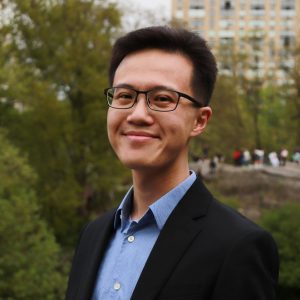
Welcome! I am a doctoral student in the Economics department at Columbia University. I served as the Lab Manager for the Columbia Experimental Laboratory for Social Sciences from July 2021 to December 2022. I received my BA in Economics from Yale in 2016.
Though digital interactions between people have become more commonplace and sophisticated, behavior in digital settings remains underresearched. A distinctive feature of the digital world is the ability to calibrate or withhold one's identifier: a person can be identified by a string of letters, an avatar, their real name, or even nothing at all. That digital identifiers allow a person to mask their physical identity also makes it difficult to attribute digital actions to a physical person, even when the actions are observed. I embed these features in an experiment where subjects play a finitely repeated, linear public goods game. Treated subjects are identified in one of three ways—by their photograph, by a random number, or by a self-designed cartoon avatar—and their individual choices are revealed and either attributed to, or decoupled from, their identifier. Consistent with the previous literature, identifying subjects and increasing the precision of attribution increases contributions relative to a baseline condition without identifiers or revealed individual choices. Remarkably, however, the largest impact on behavior comes from having an identifier in the first place: for a given level of attribution, the experimental data suggest that being identified by a number or by an avatar is as powerful as being identified by one's photograph.
Publications
Minority Turnout and Representation under Cumulative Voting: An Experiment, with Alessandra Casella and Michelle Jiang
Games and Economic Behavior, 2023 [Publisher Site]
Abstract:
Under majoritarian election systems, securing the participation and representation of minorities remains an open problem, made salient in the US by its history of voter suppression. One remedy recommended by the courts is the adoption of Cumulative Voting (CV) in multi-member districts: each voter has as many votes as open positions but can cumulate votes on as few candidates as desired. Historical experiences are promising but also reflect episodes of minority activism. We present the results of a controlled lab experiment that isolates the role of the voting rule from other confounds. Although each voter is treated equally, theory predicts that CV should increase the minority’s turnout relative to the majority and the minority’s share of seats won. Our experimental results strongly support both theoretical predictions.
Work in Progress
The Intergenerational Dilemma: Preferences over Final Distributions, with Mark Dean, Hayeon Jeong, and Zhi Hao Lim
Who Wants Their Peers To Be A Millionaire?, with Pietro Battiston, Lorán Chollete, and Sharon Harrison
Avatars, Self Image, and Social Image
Department Honors
Winner, Wueller Award for Best Teaching Fellow for PhD Courses (2020-2021)
Graduate Level
Spring 2021 — Teaching Fellow, Microeconomic Analysis II (PhD), for Yeon-Koo Che and W. Bentley MacLeod [Teaching Evaluations]
Undergraduate Level
Summer 2021 — Teaching Fellow, Principles of Economics, for Anna C. Musatti
Fall 2020 — Teaching Fellow, Political Economy, for Alessandra Casella [Teaching Evaluations]
Summer 2020 — Teaching Fellow, Economic Growth and Development, for Wendy Morrison
Spring 2020 — Teaching Fellow, Principles of Economics, for Waseem Noor [Student Comments*]
Fall 2019 — Teaching Fellow, Financial Economics, for Tamrat Gashaw [Teaching Evaluations]
*Due to the COVID-19 pandemic, Columbia did not conduct formal teaching evaluations for the Spring 2020 term.
Pedagogical Training
I have extensive training in evidence-based pedagogy and student-centered teaching practices through Columbia’s Center for Teaching and Learning. In 2023, I completed the Foundational Track of the CTL’s Teaching Development Program.
Selected Responses from Student Evaluations
Jeffrey used lots of intuitive examples and plain language to explain complicated theoretical concepts.
He was infinitely patient during both recitations and office hours, and his explanations were clear and easy to follow even if he did not immediately know the answer to a question, in which case he was very candid and promised to look into the issue further and get back to us. He scheduled extra office hours knowing how much we were all struggling in this class and sent out kind and encouraging emails to the class that, to quote one of my classmates, were “deserving of a Nobel prize” because of how compassionate they were.
I also had the opportunity to attend some of Jeffrey’s Zoom recitations, and […] I also grasped the concepts a lot better after watching his recitation videos. I regret not having attended more of his recitations!
He’s always very eager to help out. I always felt encouraged and comfortable to ask for help.
He is very good at summarizing big themes and speaking clearly. He picks up a lot of the confusion students have.
Perhaps the best example of his commitment to providing the best possible teaching assistance was the time when he realized that he had neglected to record a recitation and took the time to go over the material in the recitation a second time in order to record it and ensure that the content was accessible to those not attending live.
hes really good the only positive of this course

